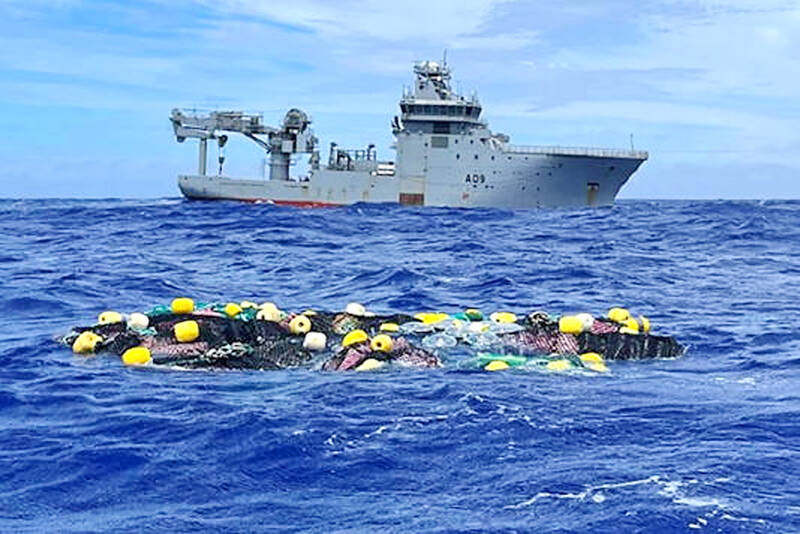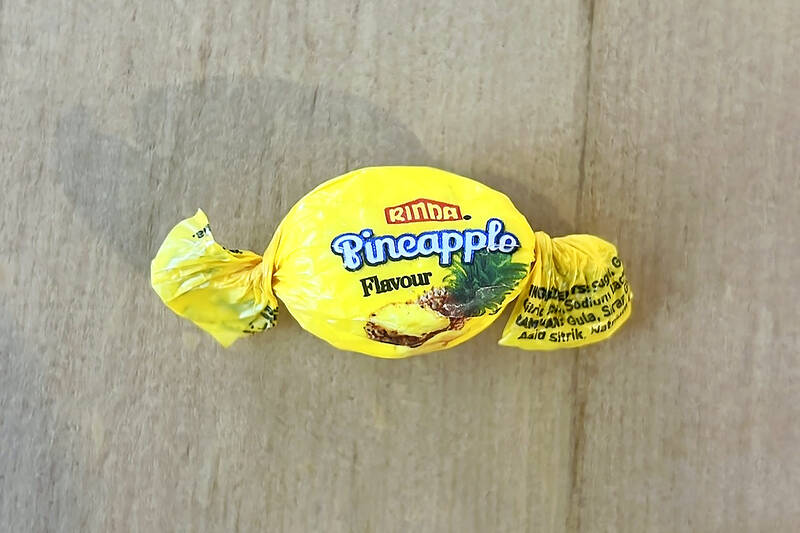A surge of drugs is engulfing the South Pacific as cartels and triads use far-flung island nations to channel narcotics across the globe, top police and UN officials told reporters.
Pacific island nations such as Fiji and Tonga sit at the crossroads of largely unpatrolled ocean trafficking routes used to shift cocaine from Latin America, and methamphetamine and opioids from Asia.
This illicit cargo is increasingly spilling over into local hands, feeding drug addiction in communities where serious crime had been rare.

Photo courtesy of New Zealand Defense Force Via AFP
“We’re a victim of our geographical location. An ideal transit point for vessels crossing the Pacific,” Tonga Police Commissioner Shane McLennan told reporters. “We have a massive ocean territory and we’ve got 176 islands that, by and large, are unprotected.”
Bricks of drugs are unloaded during stops in Pacific island ports, where they are repacked en route to lucrative markets elsewhere.
“The information coming our way is that illicit substances are coming through in general cargo that is shipped through Tonga,” McLennan said. “At the moment it’s mostly methamphetamine.”

Photo: AP
Methamphetamine use has become so rampant in Tonga — a nation of 105,000 people — that the Global Organized Crime Index likens it to an “epidemic.”
“It’s a problem here,” taxi driver Latimuli Taliauli, 39, told reporters as he waited for a passenger at the tumbledown Talamahu markets in Tonga’s capital, Nuku’alofa.
“There are some people walking around here that are damaged from the methamphetamine,” he added, pointing toward a dishevelled man staggering between rows of vegetables and local handicrafts.
Data on drug use, addiction and crime is scarce or non-existent in many of the Pacific’s developing nations, but courthouse records show a Tongan legal system clogged with drug users and dealers, from builders and mechanics to accountants and teachers.
Recent busts hint at the size of the so-called “Pacific drug highway.”
Four tonnes of methamphetamine were seized in Fiji this year, concealed in plastic-wrapped packages labeled “universal tile adhesive.”
It put Fiji on par with the “biggest” seizures reported in global methamphetamine hubs such as Thailand or Hong Kong.
Cocaine started trickling through Pacific island nations at least 20 years ago as Latin American cartels looked to feed Australia’s hunger for hard drugs.
Although Australia used only 2 percent of the world’s cocaine by volume, sky-high prices meant that by 2008 it was already the third-most lucrative market in the world, data from the UN Office on Drugs and Crime showed.
The transcontinental cocaine pipeline has in the past few years been flooded with synthetic methamphetamine and the Pacific drug trade now follows two distinct routes.
Smugglers from Latin America and the US sail through the island chains of Polynesia, en route to Tonga, Fiji and sometimes Samoa.
On the other side of the Pacific rim, drugs cooked in the jungle labs of Southeast Asia flow down through Melanesian states such as Palau and Papua New Guinea.
While cash-poor Pacific nations were only ever seen as a transit point for expensive cocaine, locals can more readily afford the cheaper, highly addictive meth.
“From what we have been gathering on the ground, it is not just in urban areas, but also in villages and rural areas,” Fijian drug outreach worker Kalesi Volatabu told reporters. “We are seeing lawlessness across the communities, in schools, and the risks and dangers in rural villages where these poisons are being spread.”
Court documents reference the murky presence of “organized and sophisticated drug cartels” in Fiji, and “international drug trafficking syndicates” in Papua New Guinea.
“The Pacific is being used by Latin American cartels, Asian syndicates and triads, Australian and New Zealand bikers, and US street gangs,” UN Office on Drugs and Crime chief of staff Jeremy Douglas said.
Global Initiative, a Geneva-based think tank, singled out Mexico’s Sinaloa cartel as “the most prominent in the arena,” while the US Department of the Treasury sanctions list the 14K triad — one of Hong Kong’s largest organized crime groups — as a major threat in Palau.

HISTORIC: After the arrest of Kim Keon-hee on financial and political funding charges, the country has for the first time a former president and former first lady behind bars South Korean prosecutors yesterday raided the headquarters of the former party of jailed former South Korean president Yoon Suk-yeol to gather evidence in an election meddling case against his wife, a day after she was arrested on corruption and other charges. Former first lady Kim Keon-hee was arrested late on Tuesday on a range of charges including stock manipulation and corruption, prosecutors said. Her arrest came hours after the Seoul Central District Court reviewed prosecutors’ request for an arrest warrant against the 52-year-old. The court granted the warrant, citing the risk of tampering with evidence, after prosecutors submitted an 848-page opinion laying out

STAGNATION: Once a bastion of leftist politics, the Aymara stronghold of El Alto is showing signs of shifting right ahead of the presidential election A giant cruise ship dominates the skyline in the city of El Alto in landlocked Bolivia, a symbol of the transformation of an indigenous bastion keenly fought over in tomorrow’s presidential election. The “Titanic,” as the tallest building in the city is known, serves as the latest in a collection of uber-flamboyant neo-Andean “cholets” — a mix of chalet and “chola” or Indigenous woman — built by Bolivia’s Aymara bourgeoisie over the past two decades. Victor Choque Flores, a self-made 46-year-old businessman, forked out millions of US dollars for his “ship in a sea of bricks,” as he calls his futuristic 12-story

FORUM: The Solomon Islands’ move to bar Taiwan, the US and others from the Pacific Islands Forum has sparked criticism that Beijing’s influence was behind the decision Tuvaluan Prime Minister Feletei Teo said his country might pull out of the region’s top political meeting next month, after host nation Solomon Islands moved to block all external partners — including China, the US and Taiwan — from attending. The Pacific Islands Forum (PIF) leaders’ meeting is to be held in Honiara in September. On Thursday last week, Solomon Islands Prime Minister Jeremiah Manele told parliament that no dialogue partners would be invited to the annual gathering. Countries outside the Pacific, known as “dialogue partners,” have attended the forum since 1989, to work with Pacific leaders and contribute to discussions around

END OF AN ERA: The vote brings the curtain down on 20 years of socialist rule, which began in 2005 when Evo Morales, an indigenous coca farmer, was elected president A center-right senator and a right-wing former president are to advance to a run-off for Bolivia’s presidency after the first round of elections on Sunday, marking the end of two decades of leftist rule, preliminary official results showed. Bolivian Senator Rodrigo Paz was the surprise front-runner, with 32.15 percent of the vote cast in an election dominated by a deep economic crisis, results published by the electoral commission showed. He was followed by former Bolivian president Jorge “Tuto” Quiroga in second with 26.87 percent, according to results based on 92 percent of votes cast. Millionaire businessman Samuel Doria Medina, who had been tipped